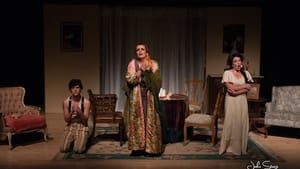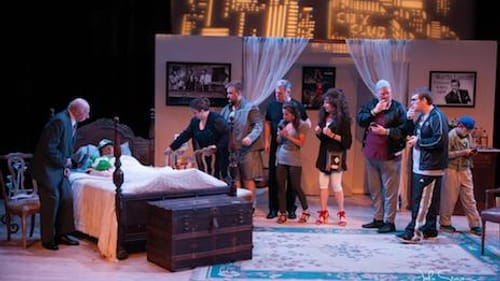Stay in the Loop
BSR publishes on a weekly schedule, with an email newsletter every Wednesday and Thursday morning. There’s no paywall, and subscribing is always free.
Puccini, Menotti, and Misha Dutka all at once
Delaware Valley Opera Company presents an operatic threesome

One-act operas are catnip for companies looking to maximize their repertory through inventive pairings over the course of a single evening. A brief Menotti work, The Medium, forms a third of Delaware Valley Opera Company’s current summer offering at Manayunk’s Venice Island Performing Arts Center, along with Puccini’s Gianni Schicchi (styled here as “Johnny” Schicchi and transported in setting from Florence to South Philly), and the world premiere of local composer Misha Dutka’s Black Horses.
The Medium
The Medium (1946) is darkly atmospheric, with a Gothic-inspired libretto (also by Menotti) and a lush score in the neo-Romantic style with which Menotti and his life partner Samuel Barber came to be associated. Schicchi (1918), though a classic buffo comedy full of obfuscation and parlor tricks, holds rich and tuneful music full of earworms galore and is unmistakably Puccini. Black Horses takes its inspiration from a Pirandello short story and attempts to capture the combination of humor, absurdism, and pathos that characterize much of its source author’s work.
The Medium was ubiquitous in the years following its premiere but has largely fallen out of the repertory, like much of Menotti’s corpus. Menotti crafted accessible works at a time when experimental works came to the forefront of music. Perhaps some opera fans today have written him off as reactionary and unfashionable.
But the opera itself is far from sentimental. Madame Flora (Paula Rivera-Dantagnan) is presented for exactly who she is: a huckster who bilks grieving families through sham séances, and a bitter drunk who verbally and physically abuses her daughter Monica (Elizabeth Holmes) and her mute and helpless servant boy Toby (Josh Gold). When Madame Flora experiences a legitimate blur between the tangible and spiritual worlds, Menotti casts the disturbance as a literal manifestation of her mental rot, leading to an epic — and tragic — breakdown.
Madame Flora is a grotesque, but Menotti stops short of making her a full-blown Gorgon; the work would hold no dramatic tension if she were merely hateful. Rivera-Dantagnan understands this and resists playing Flora as a woman beyond redemption. I fully believed the emotional extremes of a chilling scene in which Flora alternately comforts and berates disabled Toby, whom Gold imbues with vivid expressiveness. Rivera-Dantagnan’s lyric mezzo-soprano is a shade too light for a role written for a true contralto, but she compensates for this lack of sonority with deep musical intelligence.

Conversely, Holmes’s plummy soprano is richer and fuller than I am used to hearing in the role of Monica, but no less agile. She handles the melismatic demands of “Monica’s Waltz,” the opera’s most enduring aria, with ease, and her large voice easily fills the acoustically iffy auditorium. She could do more with the words throughout — particularly when acting as her mother’s accomplice during the séances, enacting the spirits of the dead children Madame Flora’s clients come to conjure. Among the trio of mourners, the supple-voiced Emily Byrne particularly stands out.
"Johnny" Schicchi
The Medium benefits from Theresa Seri’s fluid, evocative production. (I would love to give credit to the lighting designer for brilliantly capturing the opera’s psychological dread, but none is listed in the program.) “Johnny” Schicchi is not so fortunate. The South Philly conceit grows tiresome quickly, and James V. Wiest’s English-language adaptation (from a literal translation by Anne and Herbert Grossman), chock-full of winky local references, is too clever by half. Puccini’s darkly comic tale of familial avarice in early modern Italy becomes little more than a paean to Philadelphia, but civic boosterism does not a compelling opera make. And although Grant Mech brings a pleasant and evenly produced baritone to the title role, few others are cast from strength.
Black Horses
Black Horses is presented unstaged; as such, it is difficult to evaluate the work’s true dramatic potential. The intelligent libretto (by the composer) is printed in the program — fortunate, since neither tenor David Price nor soprano Elizabeth Oliver are consistently intelligible. Price sings with melting lyricism as Fofo, who understands the changing realities of the world now that automobiles replace horse-drawn carriages, but he conveys little of the horse’s world-weariness. Oliver is more interesting as Zelda, a horse who lived a pampered existence as part of a princess’s retinue, but her voice turns shrill above the staff. Dutka’s music is melodic and menacing; the work’s four-handed piano arrangement (played by music director Isaac Dae Young and Emilyrose Ristine) calls to mind the sound of prancing horses.
The musical staff provide the most consistent artistry over the course of the evening. Young does yeoman’s work as both conductor and pianist. He keeps the singers on the beat without sacrificing his own responsibilities or breaking a sweat. Ristine makes an able assistant, particularly when she shifts to the percussive duties required by the Schicchi score. The three operas come off with varying degrees of success, but the musical virtues never slip below a gold standard.
What, When, Where
Black Horses, by Misha Dutka; The Medium, by Gian Carlo Menotti; "Johnny" Schicchi, by Giacomo Puccini. Theresa Seri directed. Delaware Valley Opera Company. Through July 16, 2017, at the Venice Island Performing Arts and Recreation Center, 7 Lock Street, Philadelphia. (215) 725-4171 or www.dvopera.org.
Sign up for our newsletter
All of the week's new articles, all in one place. Sign up for the free weekly BSR newsletters, and don't miss a conversation.

 Cameron Kelsall
Cameron Kelsall